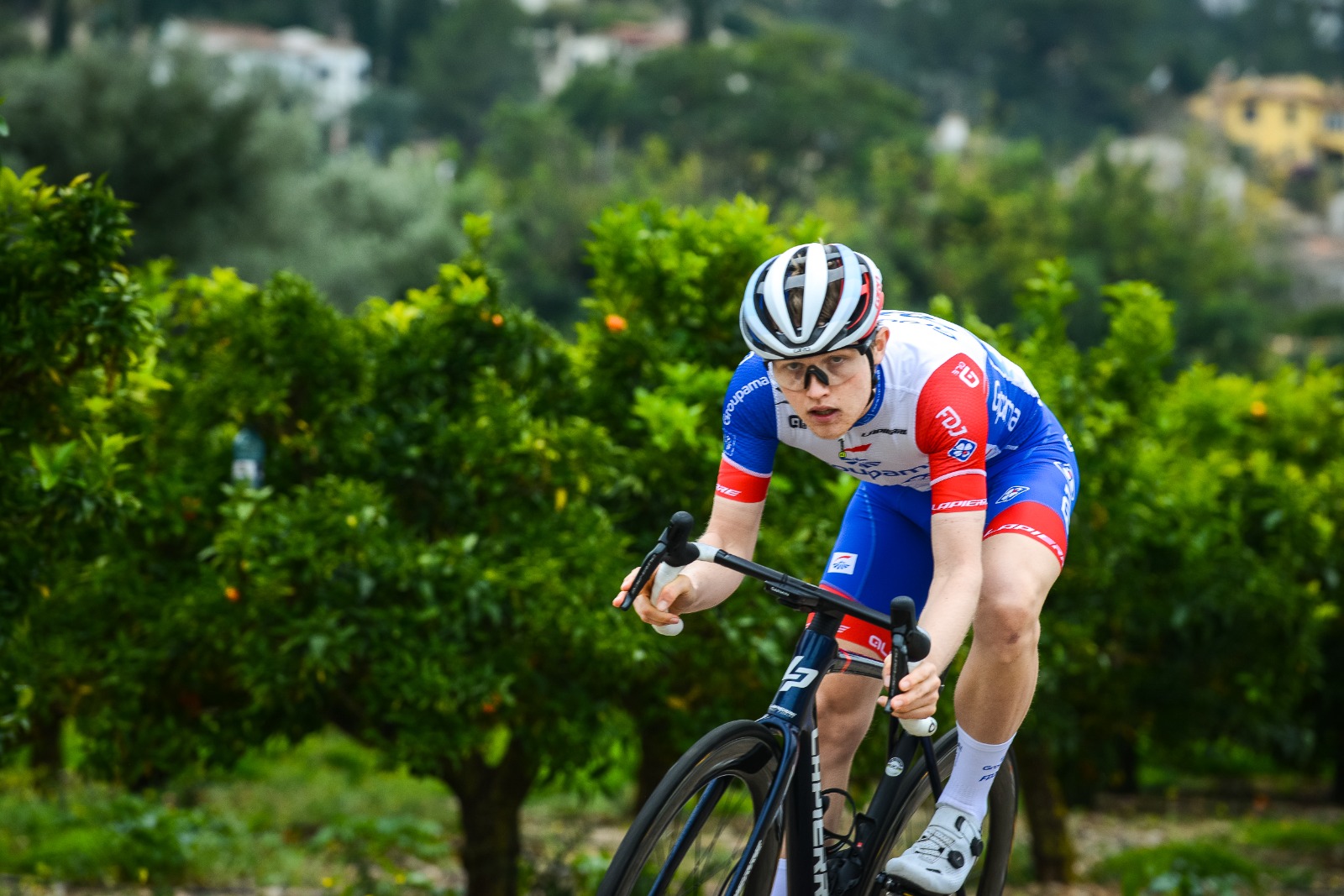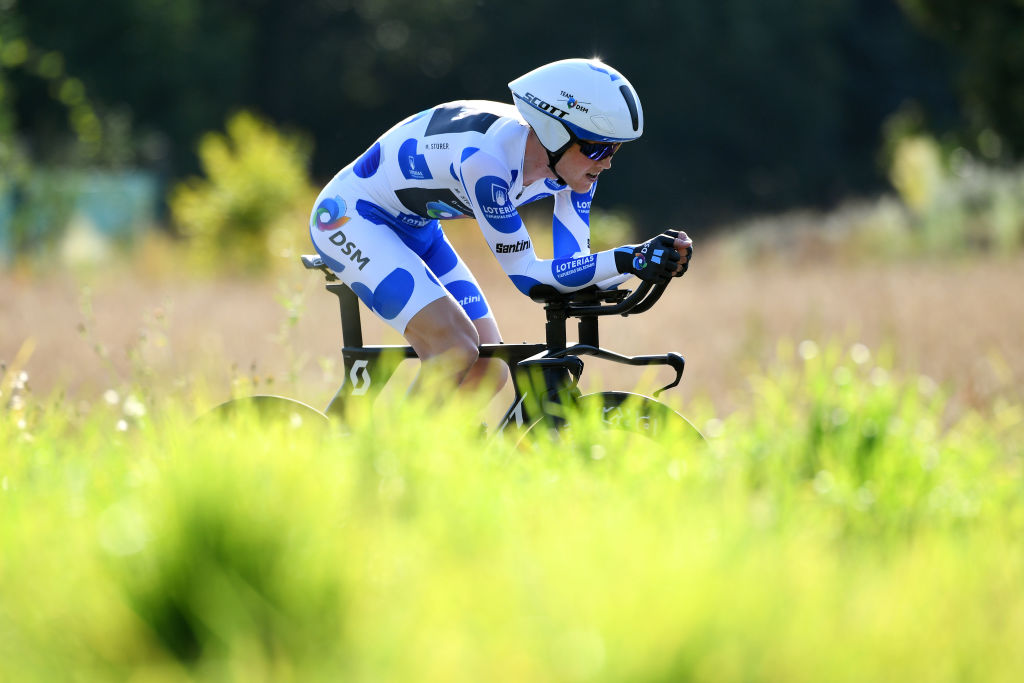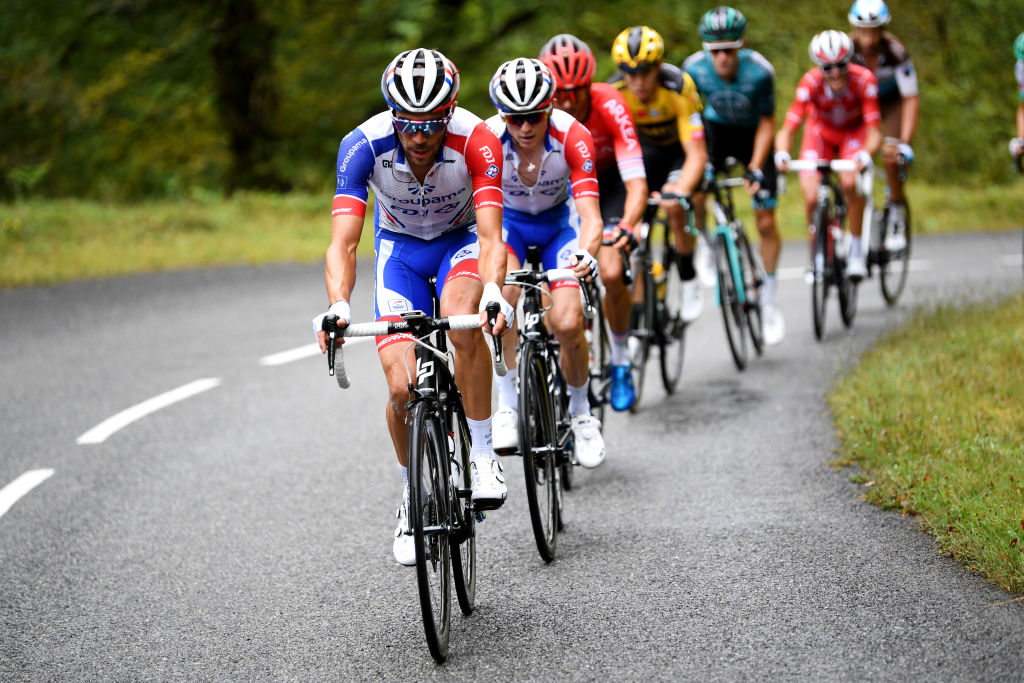Michael Storer: My goal was always to win a race, now it's which one
Q&A with Australian on Tour de France leadership, DSM exit, and that time he beat Ganna in a time trial

Michael Storer had a breakthrough European summer last year. After a few years finding his feet in the pro ranks, he suddenly couldn't stop winning.
A stage win and the overall title at the Tour de l'Ain preceded two virtuoso breakaway triumphs at the Vuelta a España, where he also walked away with the polka-dot jersey.
As such, he sets out on the 2022 season in rather different circumstances, and that's without considering his move from Team DSM to Groupama-FDJ. The French team think a lot of their new man, not only handing him a Tour de France debut but also a leadership role alongside Thibaut Pinot and David Gaudu.
With his first race of the year coming this week at the Tour de la Provence, Cyclingnews caught up with the Sydney-born, Perth-raised 24-year-old at a recent altitude training camp on Mount Teide.
He tells us about his development, that time he beat Filippo Ganna in a time trial, his move from DSM to Groupama-FDJ, and the prospect of his first Tour de France.
Cyclingnews: You had such a strong last part of the season last year, you must be raring to go again in 2022?
Michael Storer: For sure. Joining a new team is already a big change, but it’s been really exciting. I’ve also got some new goals for this season, too. It’s quite different, because my goal for the past few years was working towards winning a race. Now I’ve won a race, it’s more like ‘which races do I want to target?’
Get The Leadout Newsletter
The latest race content, interviews, features, reviews and expert buying guides, direct to your inbox!
CN: How much confidence did you take out of last season?
MS: Quite a lot. Before I won those races, I wasn’t sure if I ever could or not. Actually, the Vuelta the previous year [2020], when I was third on one stage, that gave me a lot of confidence, so it actually maybe started 12 months earlier. At that point I went ‘ok, if I can get this little bit extra then I can have enough to win a stage’.
CN: I’m interested in your progression, because it feels like you broke through or burst onto the scene last summer, but actually you’ve been a pro for four years. How do you see it?
My progression is… extremely linear, to be honest. The Vuelta is a great example. The first Vuelta I did [2018], I was just trying to finish, the second one [2019] I actually tried to get in breaks, and I think I got in one, so that was a bonus. The third one [2020], I was a bit stronger, I was in three breakaways and was third on a stage. Then obviously last year happened. So it’s been very linear.
CN: How have you made those steps? Where have the improvements come from?
MS: Just working on everything to make me a better bike rider: nutrition, training, recovery, bike skills, psychology. It’s everything. You have to look at all those different pillars of performance.
CN: I’m also interested in what kind of rider you are, because you seem to be a climber but then you look down your results sheet and you won bronze in the junior TT at World Championships in 2014, beating a certain Filippo Ganna….
MS: The first and last time (laughs). I won’t ever beat him in a TT again unless it goes up a mountain. But I do want to work on my TT again, and the team wants me to as well. I’m not really a time triallist; it’s more a case of when you’re strong in the juniors, you don’t have to be so specialised. I could time trial good and I could climb good, and if you’re strong as a junior you can do it. But then directly in the U23s, it already branches off a bit.
CN: So what type of rider are you?
MS: Just a climber in general. I’m better on the longer climbs, typically. The harder the race the better for me.
CN: And how would you rate your time trial strength now?
MS: Slightly weak, I’d say. I think it could be possible to do a better TT, if I work on it and everything is there. I’ll never be winning time trials but if I have GC goals in the future, then it’ll be a case of ‘at least I’m not losing it in the TTs’.
CN: So that’s where you see yourself, as a GC rider?
MS: At the moment, no, but there’s no harm in trying. If I’m not successful then that’s also no problem. For now, I think it’s a mixture, because I still want to win more races. Sometimes you ride GC and never get to win a stage or even go on the attack, so a mixture is the best approach for me.

FDJ & DSM
CN: Which brings us on to Groupama-FDJ and the Tour de France. First of all, I’d like to understand why you made the move from DSM, at a time where you were on the cusp of such success.
MS: I wanted to go to a team with a different approach. You can learn a lot more when you go to a new team. Maybe they do some things better, and you take what you learned from the other team, combine everything, and hopefully become a better rider.
CN: You didn’t break your contract but so many riders have done so at DSM that when a big name leaves it’s tempting to wonder what went wrong. We know you were sent home from a camp for leaving the hotel to buy shampoo, but were you unhappy at DSM?
MS: I wasn’t unhappy, and I understood that [the shampoo incident]. With DSM, at the moment the focus is on the really small issues – things you don’t really need to worry about. But the things I really respect DSM and Iwan [Spekenbrink, team manager, for] are their anti-doping stance, and also trying to make the cycling financial model better. If you zoom out, I think it’s a really good team for the cycling world.
CN: So you left on good terms?
MS: Yeah for sure. You can always find little details and things but it depends where you look. You can nitpick any team, in my opinion.
CN: How did the move to Groupama-FDJ come about?
MS: We started to talk after the Giro. As you see with the contract market, it’s not wise to wait, especially during COVID. It’s such an important decision, so you have a lot of meetings to work out what’s best for the future. There were some other teams interested, but with Groupama-FDJ I liked the structure of the team. It’s very professional, but with a bit more flexibility in certain areas. It’s a team that really looks after the riders and tries to get the best out of everyone. They really want to make you better.
CN: First impressions of the boss, Marc Madiot?
MS: A very charismatic guys. He brings a lot of energy to the team, which is really positive and encouraging.
Tour de France leadership

CN: When presenting the squad and the goals for 2022, he talked about a trio of leaders for the Tour de France. That was a surprise to us – was it a surprise to you?
MS: Yes, somewhat. The team thinks I can do it, so I’ll trust that, if they think I can be at the level to be with the best at the Tour de France. I guess it’s a bit of an unknown for me.
CN: How will it work? Obviously Pinot is a proven Grand Tour contender, Gaudu is rising as a GC rider, and then there’s you. Is there a hierarchy, and how does that look in terms of tactics.
MS: It’s still a long way off but, as it stands, we’ll try and go in with three options and see how the race pans out. It’s a long way to the Tour, and if someone gets sick beforehand, it’s good to have more options than just one guy. The tactics are still in the very early stages of being decided. We’re still months away, so it’s impossible to say. Maybe a few weeks out I can answer that question better, but I guess the general idea is we’re the three leaders going in, a collective effort in the mountains, that kind of thing.
CN: Do you feel ready for that leadership role? You are, by all accounts, a quiet man. Is leadership something that comes naturally, especially in a French-speaking team?
MS: I don’t think quiet makes a bad leader. It also depends on the situation. I’m a quiet guy but, at Tour de l’Ain, I was the leader there and I got the best out of the guys there. We had probably one of the weaker teams on paper but we had a good plan and knew what to do. Communication is an important part of leadership. It’s about talking a lot before the race, how we think it’ll go, talking through the plan with riders and staff, then getting everyone to buy into the plan, to own the plan, then it’s a lot easier on race day.
CN: How is you French, by the way?
MS: Improving… I only spoke Italian and some Spanish before so I had a bit of a head start. The team also provides us with lessons. Everyone has been really friendly and made me feel really welcome, even if I don’t speak French well yet. I can understand what they’re saying but they help me as well.
CN: What’s your race programme?
MS: I start in Provence, then Tour du Haut Var, then Paris-Nice and Volta a Catalunya. After that it’s Tour of the Alps and Tour de Romandie, then Dauphiné and the Tour. The first big test will be Paris-Nice and Catalunya. The first two races are more about getting back into the rhythm of racing.
CN: With the change of teams, have you made any big changes to your approach over the off-season?
MS: Without giving away top-secret information, it’s been a small shift. The training I did into the last part of last season worked really well so it would be crazy to try something different. It’s a similar approach but with some different things, especially with the dietician here. At DSM we were focusing a lot on hydration and things like that and here we’re trying to optimise different elements of diet.
CN: Finally, what do you want to get out of this season, and how do you build on last year?
MS: I’d like to win a race again this year, and it would be nice to win a WorldTour race. Once I’m in good enough form I’ll try and go for it. I’d also like to win another Grand Tour stage. Those are the big goals.
Patrick is a freelance sports writer and editor. He’s an NCTJ-accredited journalist with a bachelor’s degree in modern languages (French and Spanish). Patrick worked full-time at Cyclingnews for eight years between 2015 and 2023, latterly as Deputy Editor.
